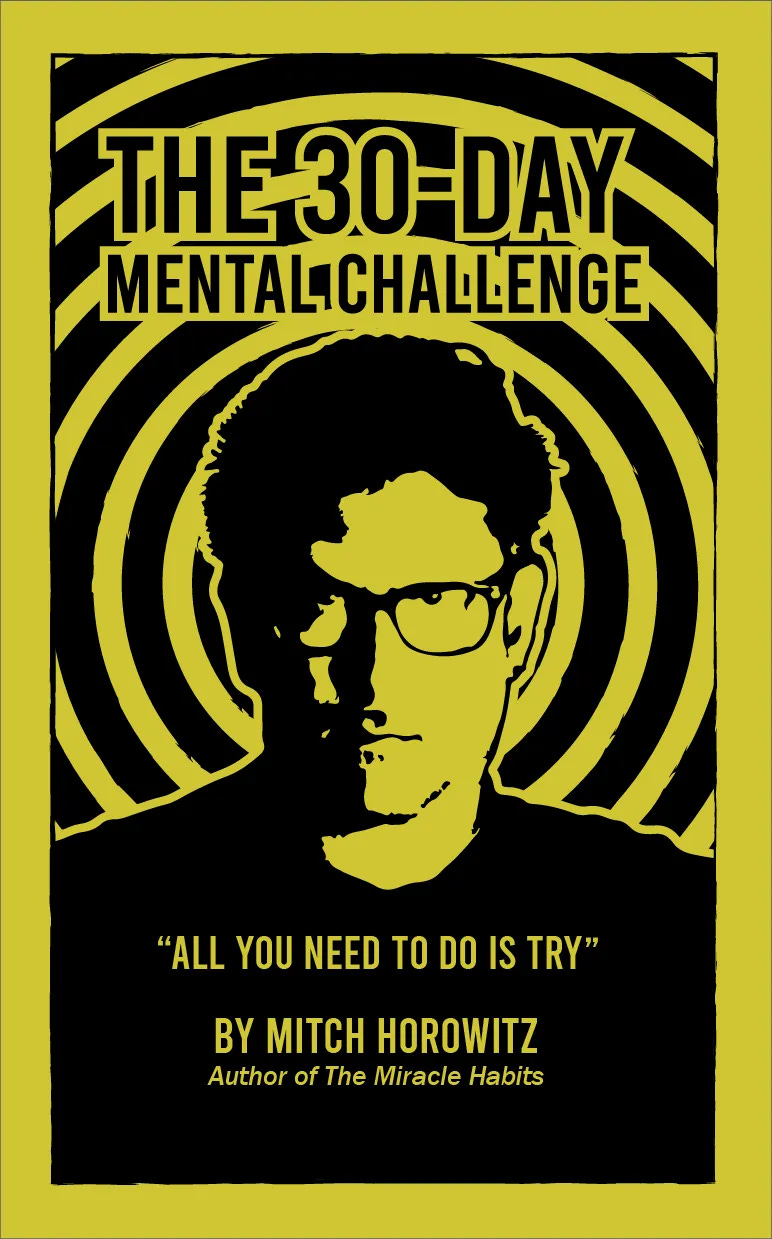The 30-Day Mental Challenge
All you need to do is try

This little piece has generated more testimonials and requests than any I have ever written. From my experience and that of myriad seekers: it works. Try it. -M- x
* * *
American philosopher William James (1842–1910) yearned to find a practical spirituality, one that produced concrete improvements in happiness.
The Harvard physician grew encouraged, especially in his final years, by his personal experiments with New Thought, which in his 1902 The Varieties of Religious Experience he called “the religion of healthy-mindedness.” I challenge today’s seekers to continue James’s search for a testable, workable spiritual system. Will you attempt a 30-day experiment that puts positive-mind metaphysics to the test?
The experiment is based on a passage from a 1931 book, Body, Mind, and Spirit by Elwood Worcester and Samuel McComb. The authors, both Episcopal ministers, in 1906 founded the Emmanuel Movement, a respected healing ministry popular in the early twentieth century. The Emmanuel Movement was named for Emmanuel Church in Boston’s Back Bay. Worcester and McComb, joint pastors of the church, drew together ministers, physicians, psychologists, and patients to study and apply the regenerative abilities of the mind.
They collaborated with mainstream scientists, the most remarkable of which was Harvard physician and researcher Richard C. Cabot (1868–1939), who acted as Emmanuel’s chief medical adviser. Cabot aimed to wed the possibilities of mind- power to scientific rationalism, and thus devise a mental therapeutics that could win allies among medical authorities.
In Body, Mind, and Spirit, a prominent scientist, who the authors did not name, told a small audience how he radically improved his life through a one-month thought experiment. I have condensed his testimony:
Up to my fiftieth year I was unhappy, ineffective, and obscure. I had read some New Thought literature and some statements of William James on directing one’s attention to what is good and useful and ignoring the rest. Such ideas seemed like bunk—but feeling that life was intolerable I determined to subject them to a month-long test.
During this time, I resolved to impose definite restrictions on my thoughts. In thinking of the past, I would dwell only on its pleasing incidents. In thinking of the present, I would direct attention to its desirable elements. In thinking of the future, I would regard every worthy and possible ambition as within reach.
I threw myself into this experiment. I was soon surprised to feel happy and contented. But the outward changes astonished me more. I deeply craved the recognition of certain eminent men. The foremost of these wrote me, out of the blue, inviting me to become his assistant. All my books were published. My colleagues grew helpful and cooperative.
It seems that I stumbled upon a path of life, and set forces working for me which were previously working against me.
Let’s repeat this experiment together: 1) Choose your start date, 2) write out the full quoted passage above by hand (never underestimate the value of that), and 3) add: “I dedicate myself on this day of __________ to focus on all that is nourishing, advancing, and promising for thirty days (signed) ”
That’s it.
I suggest writing this passage on an index card and on the reverse creating a grid in which you mark off each of your thirty days. I advise rereading the scientist’s testimony each morning and each time you mark off a day, as well as whenever it feels necessary.
You may want to carry your statement with you during the day. Whenever you find yourself sliding into old habits of thought, do not worry; simply steer back to the experiment. You do not need to start over. Just carry on.
I keep the 30DMC gratis. If you like it, please consider a paid subscription or buy me a coffee.



I read this book of yours last year when I was recovering from a broken leg. It inspired me in my writing of my own book about breaking up with (or taking a one month break from) any habit that’s holding you back from being sovereign (a word that may overused but has so much meaning).
Once again, you’re one of my favorite thinkers.
OK! wowie kazowie. what a great bunch of people responded to this: after the 2nd comment I was over my initial impulse, which was, great idea, soon. soon I will do this. The tone of the challenge and most especially of the comments is so different from the positive thought bandwagon which is in fact deep denial --- that is not at all the flavour of the people commenting this morning. very encouraging, very inspiring, getting my index card (and me too -- have been using a fountain pen lately: my step-father's Mont Blanc: what a prize! ) as soon as I press Post. Thank you all!